
Gustav IV Adolf or Gustav IV Adolph was King of Sweden from 1792 until he was deposed in a coup in 1809. He was also the last Swedish monarch to be the ruler of Finland.

Frederica of Baden was Queen of Sweden from 1797 to 1809 as the consort of King Gustav IV Adolf.

Prince Gustav of Vasa, Count of Itterburg, born Crown Prince of Sweden, was the son of King Gustav IV Adolf of Sweden and Queen Frederica. His Austrian princely title was actually spelled Wasa.

Princess Anna Amalia of Prussia was an early modern German composer and music curator who served as princess-abbess of Quedlinburg. She was a princess of Prussia as the daughter of Frederick William I of Prussia and the sister of Frederick the Great.
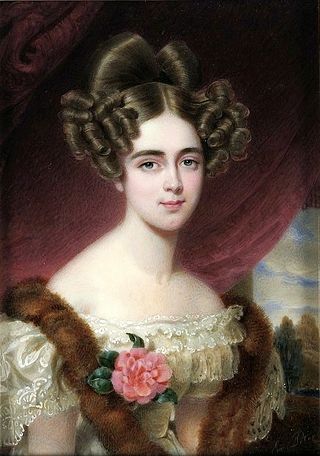
Cecilia of Sweden was a composer, a Swedish princess by birth, and Grand Duchess of Oldenburg by marriage. She was the daughter of King Gustav IV Adolf of Sweden and Frederica of Baden.

Princess Sophia Albertina of Sweden was the last Princess-Abbess of Quedlinburg Abbey, and as such reigned as vassal monarch of the Holy Roman Empire.
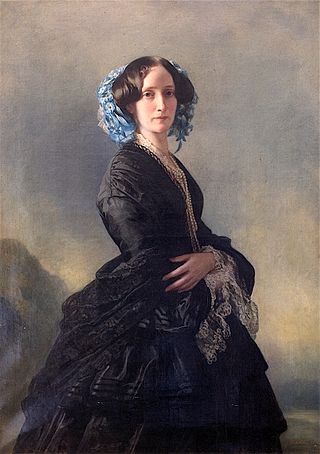
Sophie of Sweden was, by marriage, Grand Duchess of Baden as the wife of sovereign Grand Duke of Baden, Leopold.
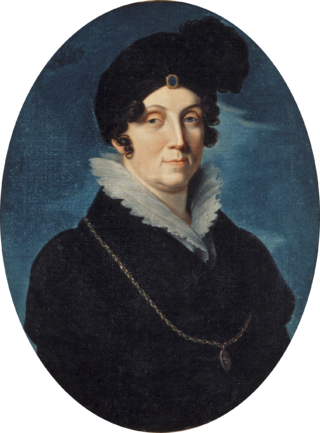
Princess Amalie of Hesse-Darmstadt was a Hereditary Princess of Baden by marriage to Charles Louis, Hereditary Prince of Baden. She was the daughter of Ludwig IX, Landgrave of Hesse-Darmstadt and Henriette Karoline of Palatine-Zweibrücken.
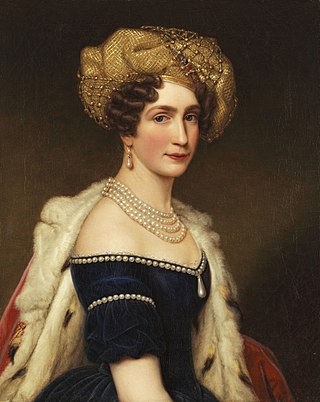
Princess Augusta of Bavaria, Duchess of Leuchtenberg was the second child and eldest daughter of Maximilian I Joseph of Bavaria and Princess Augusta Wilhelmine of Hesse-Darmstadt. By marriage, she was a French princess.

Amalia is a female given name, derived from the Germanic root amal, with meanings "vigorous, active, work", specifically the woman's name Amalberga. Its popularity is attributed to the Belgian Saint Amalberga of Maubeuge. The origins of the name Amalia have often been associated with those of Emilia and Emily, both of which in fact originate from the Latin nomen Aemilia, or with Amalthea, which originated from the Greek name "tender goddess". In Greece, the name is celebrated on 10 July in honour of Saint Amalia.
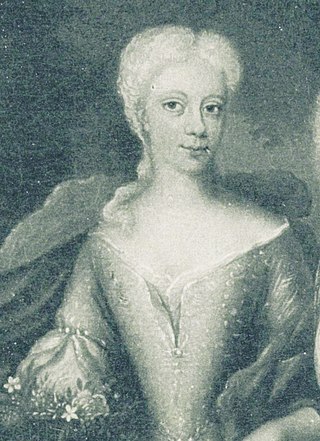
Princess Amalia of Nassau-Dietz was a Dutch princess and the wife of Frederick, Hereditary Prince of Baden-Durlach, and mother of Charles Frederick, the first Grand Duke of Baden.

Maria Charlotta Cedercreutz, married surname Wrangel (1736–1815), was a Swedish artist, lady-in-waiting and baroness. She was a member of the Royal Swedish Academy of Arts.

Hedvig "Hedda" Eleonora von Fersen was a Swedish noble and a lady in waiting to the Swedish queen, Sophia Magdalena of Denmark. She was the daughter of Axel von Fersen the Elder and Hedvig Catharina De la Gardie, and the sister of Count Axel von Fersen the Younger, Sophie Piper and Fabian von Fersen (1762–1818). In 1773, she married marshal Baron, later Count Thure Leonard von Klinkowström in his second marriage, and with him had four children, among them was the artist Hedvig Amalia Charlotta Klinckowström and Count Axel Leonhard von Klinckowström, member of the Royal Swedish Academy of War Sciences and la Société pour l'encouragement de l'industrie nationale.

Anna Amalia von Helvig was a German and Swedish artist, writer, translator, socialite, Salonist and culture personality. She is known as an inspiration for many artists. She was a member of the Royal Swedish Academy of Arts.

Charlotta Aurora De Geer later Gyldenstolpe and Wetterstedt (1779–1834), was a politically influential Swedish countess, salonist and courtier.

Princess Charlotte Amalie of Denmark and Norway was a Danish princess, daughter of King Frederick IV of Denmark and Louise of Mecklenburg-Güstrow.

Aurora Wilhelmina Brahe née Koskull was a Swedish lady-in-waiting and politically active salonist.

Marie of Baden was Duchess of Brunswick-Wolfenbüttel and Brunswick-Oels. She was married to Frederick William, Duke of Brunswick-Wolfenbüttel.
Ebba Wilhelmina Modée, was a Swedish noble and courtier, the love interest of king Gustav IV Adolf of Sweden.
Hedvig Amalia Charlotta von Klinckowström was a Swedish countess, courtier and artist. She is known for her portraits and illustrations in drawings and miniatures on ivory, which are regarded to provide an historical valuable image of the contemporary Swedish aristocratic life.


















